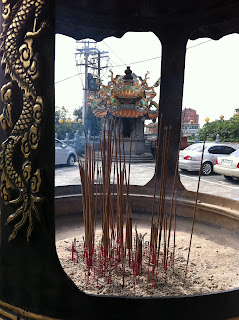In Asia, Chinese New Year is probably the most rambunctious and jubilant time of the year. Almost everyone has the week off from school and work, and a lot of people like myself, fly back to Asia specifically for Chinese New Year. It is a time for celebration, family and traditions.
Celebrations begin on New Years Eve, and for us, it started with breakfast at my grandmother's house. Tradition dictates that you spend New Years with the male's side of the family, so we went to my dad's mom's house. Most people in Taiwan are Buddhist and have an altar at home for their specific family deity and also for ancestors. The morning starts with praying to the deity and ancestors and showing them offerings of food, flowers and the burning of incense.
This is the altar at my grandmother's house. The picture on the far left is of my great grandmother. the table in front of the altar has offerings of various food and also paper money.
Decorations in my parents' building
Most people will also tape writings of well wishes and luck on their doors. These are generally written on red paper.
One of the most important meals during this time is the family dinner during New Years Eve. As it is with the male's side of the family, my dad's older and younger brothers and their families all came over for dinner. The dinner will usually have some kind of fish and noodles, and depending on the region, there may also be dumplings and nian gao. We're not that traditional. We only had noodles. Noodles symbolize a long life, which is why it is very taboo to "cut" your noodles into smaller pieces during this time. It basically means you are cutting your own life short. The Chinese word for fish is "yu," which is also the same phonetic sound as the word for abundance. Having fish at the meal therefore symbolizes a year full of abundance. Almost all foods served during New Years have some kind of meaning, mostly from phonetics. Our family dinner:
::correction:: I asked my dad about not having fish at dinner, and he said we did have fish. We just don't eat it. This way, we still have "yu" (abundance) for the next year!
After dinner, most families then head to the temple. Traditionally, there is a race to be the first person to place their incense stick into the censer at the stroke of midnight. For us, we get there as early as possible to avoid the crowd because of my grandmother's age. At the temple, one prays with incense to the different deities for good health, fortune and other wishes for the coming year.
We again went to the Ma Zu temple that I mentioned in my previous post. This is the temple at night:
My cousin & my uncle praying with incense sticks, and my grandmother praying at the temple:
The night continued with sounds of firecrackers in the streets. It was surprisingly a nostalgic sound to fall asleep to. The next morning, tradition dictated that we return back to my grandmother's house for breakfast. Breakfast on the morning of New Years day is usually a vegetarian one. According to my uncle, this is because during New Years Eve, it was believed that the world would end, and when morning came and people saw that they were still on earth, they would abstain from meat as a show of thanks. After breakfast, we again went to the temples to give offerings and to pray for the new year. Instead of going to the big Ma Zu temple (which, by this time, would be so crowded it would be impossible to get into), we went to two local temples, one of which my grandfather helped to start over 40 years ago. His name is on the plaque on the wall. The local temples are places where the deities protect the local people, people in that particular neighborhood.
This is the interior of the temple that my grandfather helped to start:
Other pictures from New Years:











I learned more about Chinese new year in this post than in the last 28 years of my life. And you say your family's not traditional, psh! I got two red envelopes and that was it!
ReplyDelete